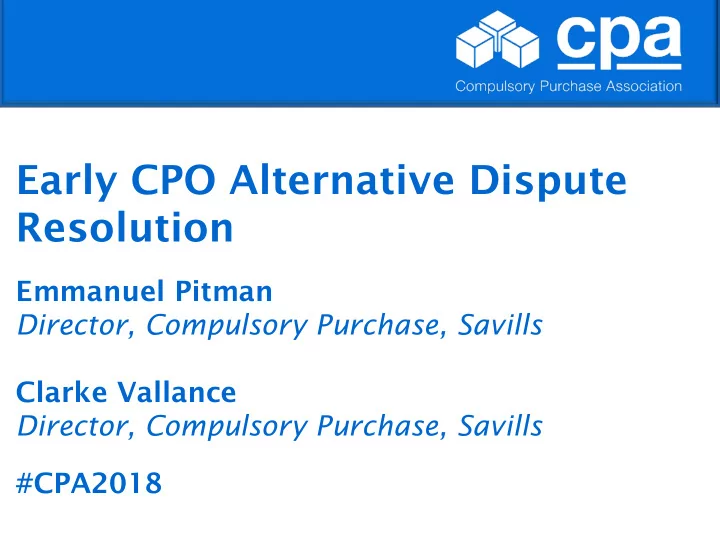

Early CPO Alternative Dispute Resolution Emmanuel Pitman Director, Compulsory Purchase, Savills Clarke Vallance Director, Compulsory Purchase, Savills #CPA2018
Early CPO ADR RICS Independent Evaluation
Background – Catalyst for change • Over inflated claims vs Low-ball initial payments • Polarised from the start (perverse logic) • Tribunal reference premature (time consuming & costly) • Small claims/claimants “frightened” of Tribunal • Existing forms of ADR rarely used
Current forms of ADR – Is there an issue? • Difficult to agree a form of ADR – with the result being it does not get used – leading to a dispute about how to resolve the dispute • Can be costly, with no guarantee that it will lead to a settlement • AAs often will not use ADR where they believe the costs are likely to be disproportionate to the claim • There are no bespoke CP ADR schemes – tailored to resolve CP related disputes
Aims • Bespoke CP ADR with smaller/lower value/less complex claim focus • Provide Independent review (3 rd party evaluation) of claims • Lower cost (more accessible), less formal alternative to Tribunal • Avoid drawn out battles over misconceived/partisan positions • Focus parties on realistic parameters early in process
Proposal • RICS to introduce a new form of Independent ADR tailored specifically to meet needs of Compulsory Purchase compensation disputes • A familiar and consistent system • Both parties bear cost of their own representation. Costs claimable as part of the compensation claim • Expect the cost of the “Independent Evaluation” paid by AA • Evaluator could comment on AA’s costs if claimant unreasonable (to be deducted from the advance payments) • Non-binding (unless otherwise agreed by BOTH parties) • Tribunal remains available if parties fail to ultimately agree • Outcome available to Tribunal (for determination of costs)
Underlying Principles • Third party RICS appointed • Timetabled process Evaluator • Further advance payment • Objective “arms length” on Outcome review • Independent Expedient Realistic positions earlier • Reasoned written outcome • Limited cost (Evaluator • Structured process Accessible Consistent costs paid by AA, other • Familiar to industry reasonable costs claimable participants as part of claim) • RICS Trained Evaluators • Less formal environment • RICS monitored • Avoid “Arms Race / Mini - tribunal” • Aligns with Pre-reference • Clear written outcome – available to protocol Tribunal in due course (for deliberation of costs)
Evaluation Procedure • Request • Evaluation Proposal Notice • Reply to Evaluation Proposal Notice Stage 1 • Evaluation Request • Appointment • Preliminary Information Request (if required) • Replies to Preliminary Information Request (if required) Stage 2 • Appointment Notice
Evaluation Procedure cont … • Submissions • Submissions Deadline • Independent Evaluator’s Information Request Stage 3 • Replies to Independent Evaluator's Information Request • Outcome • Reasoned, written Evaluation Outcome Stage 4
Summary • Independent • Expedient Clearer, fairer and faster • Consistent • Accessible
Other likely benefits • Encourage early and realistic claims and Advance Payments • Reduce polarisation and resulting cost escalation • Enable resources to be employed on the next project • Freeing up Tribunal capacity for complicated claims
Next steps • RICS consultation launch
Recommend
More recommend